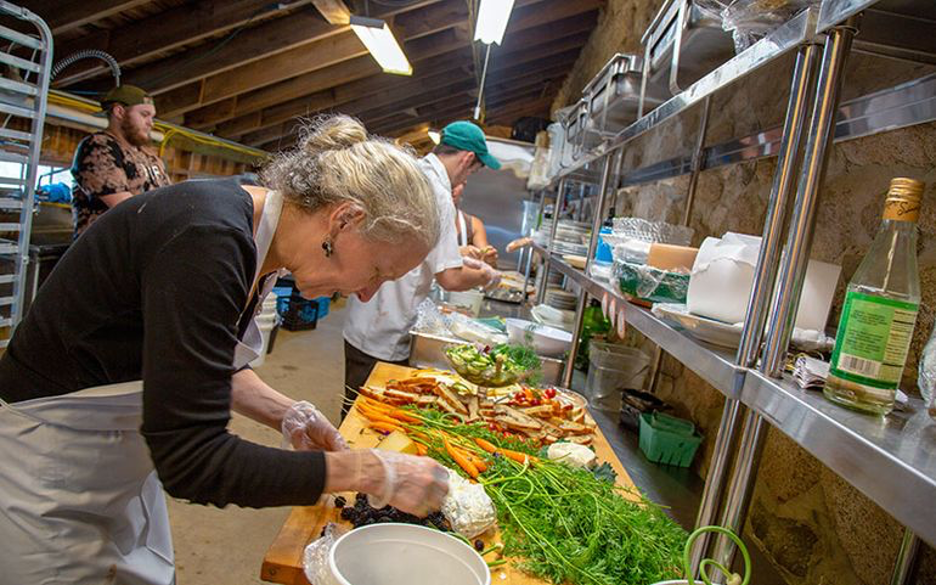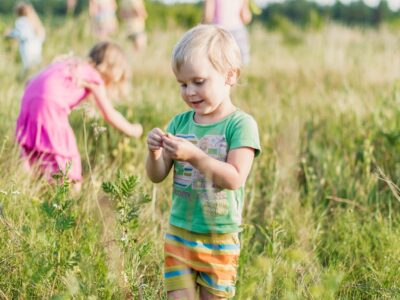“Everyone cares about food,” declares Maya Atlas, Program Director of the Institute for Local Food Systems Innovation (ILFSI) at Saint Joseph’s College of Maine (SJC). Atlas’ simple, powerful remark refers not only to the Institute’s raison d’être fueling its creation in 2017, but also to the impact it has had on the College’s campus in Standish and in the surrounding Sebago Lake communities.
Food…food sustains all life. Yet for humans, the act of consuming food transcends a purely procedural intake of nutrients. Food brings us together as we convene over meals exchanging tales of our days’ ups and downs. We introduce each delectable morsel into our mouth, one of us rambling on as the other chews, listening attentively, or perhaps interjecting comments and laughing. We gather together for birthday dinners, holiday feasts—or really any occasion to relax and share a nice meal peppered with meaningful conversation. Ultimately, food binds us together, building and fortifying communities.
“Where Community Grows”
At SJC, however, the reverse is also true: its community strengthens around (and grows) food. Fittingly, the 1,000-student College’s recent rebranding has given rise to its new motto “Where Community Grows”. Given SJC’s longstanding commitment to sustainability and wellness, ILFSI has provided a means for SJC to produce food and advance community goals in conjunction with the institution’s pursuit—in following with the Sisters of Mercy precepts, on which the group founded SJC in 1912—of social and environmental justice.
The seeds of ILFSI were sown as early as 2004, when SJC purchased and incorporated a farm adjacent to its campus. In hopes of fostering connections with nature and leading more sustainable lifestyles, students began planting crops, but found themselves limited by Maine’s notoriously frigid winters. At roughly the same time, the state fell into an ongoing economic slump, in large part due to its steady decline in manufacturing jobs that had been underway since the 1990s. In 2017, SJC’s Office of Mission-Aligned Businesses launched ILFSI as part of embodying its institutional commitment to sustainability and community. In its incipient phase, the Institute included five interrelated enterprises—some of them necessitating construction projects to operate—the development and deployment of which entailed bringing various stages of food systems to campus. The idea behind the Institute’s operations was to bolster Maine’s economy by promoting job training and creation in the food/beverage and hospitality sectors.
Atlas took over as ILFSI’s Program Director two and a half years ago. Since her appointment, skyrocketing building costs prompted a slight shift in institutional direction, with leadership joining sustainability at the core of the College’s path moving forward. Essentially, food will remain central in SJC’s ventures, along with integrative aging and hospitality. While this realignment has meant halting some of ILFSI’s construction projects for the time being, many of the Institute’s primary goals remain intact with SJC promoting community engagement and sustainability by focusing on educating tomorrow’s local and regional leaders.
Radical Hospitality Meets Sustainability: ILFSI’s Stone Barn and the Freight Farm
At ILFSI’s inception, SJC renovated its existing Stone Barn, transforming it into an agritourism hub for Cumberland County events, and the Institute harnessed Prof. Mark Green’s hydroponics expertise to explore possibilities of year-round crop production. Concretizing SJC’s foundational principles, these two ILFSI operations provide students with multilayered opportunities to develop skill sets in sustainable leadership and community engagement through the common element of food.
In addition to hosting its annual, locally-sourced Farm-to-Table dinners, the Barn serves as a sustainable space for weddings, educational events, concerts and more. In the spirit of radical hospitality—a primary tenet of Catholicism—it opens its doors to the community, bringing to the fore the host-guest relationship and cultivating an embracing, inclusive environment for community gatherings. The Barn also allows for students of varied interests and talents to locate and explore their points of intersection. For example, Elyse Caiazzo, a small-scale local farming advocate aiming for a community leadership role, was able to combine her passions while working as student ambassador for ILFSI.
All the salad greens served in the Stone Barn—and on SJC’s campus—are grown in the campus’ Freight Farm, a 320-square-foot hydroponic growing system donated to SJC by the Hannaford Charitable Foundation in 2017. Devised and assembled by Freight Farms, an agricultural technologies company in Boston, SJC’s vertical growing system produces two varieties of lettuce as well as arugula, kale, and edible flowers. The year-long, entirely student-run venture operates on an eight-week growth cycle and produces roughly 40 pounds of greens per week—enough to supply Pearson’s Café, the College’s dining hall and its less formal eatery Baggot Street.
Sustainability: From Classroom to Community
ILFSI’s purview extends well beyond promoting sustainable event programming, traditional local farming, and on-campus hydroponic growing. With the College’s drive to bring experiential learning to the classroom, food systems has become one component in the creation of the up-and-coming leadership for sustainable communities major. Developed by Community-Based Learning Director Kimberly Post, the new interdisciplinary major comprises four tracks—healthcare, justice, economic, and environment—from which students can choose one or two. Post—also an interdisciplinary studies faculty member and Engagement Coordinator of the Center for Sustainable Communities—noted that students wanting to work for ILFSI might choose the justice and environment tracks. Doing so would allow them to explore leadership opportunities in sustainable agriculture as well as food justice. Students wishing to land careers in agritourism might select the environment and economic tracks.
“The goal is to have this robust basket of courses that can work for many of those tracks, because they are interdisciplinary and multidisciplinary so students can kind of pick and choose and, and really guide their own directions,” Post explains.
Post’s vision includes cultivating opportunities for engagement both on- and off-campus: “We also are trying to build a model of collaboration among our faculties, so that’s where the interdisciplinary and multidisciplinary come in as well. It’s not just taking courses from different disciplines, but actually having faculty of different disciplines come in and create courses together and co-teach those courses.” Each course students take will carry a community component, allowing them to apply what they learn in the classroom and really make a difference in Standish and its surrounding areas. In this sense, Post aspires to train “transformational leaders” for the 21st century. Firmly grounded in the humanities—which Post notes are celebrated at SJC—the Leadership for Sustainable Communities program will form leaders who have cultivated the critical-thinking capacities required in effective leadership.
Atlas’ work with ILFSI and Post’s with the Center for Sustainable Communities is encouraged by SJC’s small size, which gives it the “nimbleness”—a quality repeatedly evoked by Atlas—to facilitate intra-institutional collaboration, the fruits of which can then be shared with the Cumberland County community. As a holistic-thinking community engagement professional, Post says that over time, she’s been figuring out how she can “gather and gather and gather and bring everybody into one wheel so that we can all work together.”





 Copyright
2024
Root and Vine
Copyright
2024
Root and Vine